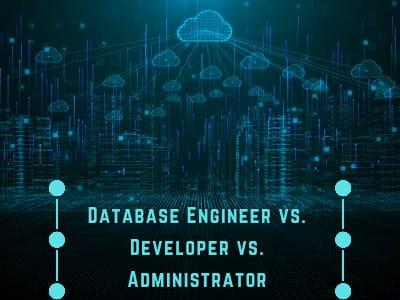- July 24, 2024
by Gauri Wahab - Sr. Sales & Marketing Officer
Are you confused about the differences between database engineers, developers, and administrators? You're not alone! In this blog post, we will break down the unique roles and responsibilities to help you better understand how they contribute to the success of a company's databases. Whether you're considering a career in database management or simply want to learn more about these essential roles, this guide will clarify what sets them apart and how they work together to ensure smooth operations. Let's dive in!

Introduction to the Different Roles in Database Management
Welcome to the dynamic world of database management! In this digital era, where data reigns supreme, the roles of Database Engineers, Developers, and Administrators play a vital role in ensuring seamless operations. Let's dive into the intricacies of each position and unravel their unique contributions to the ever-evolving realm of databases.
- What is a Database Engineer?
Ever wondered about the unsung heroes behind the scenes of data management? Enter the database engineer. A mastermind in designing, developing, and optimizing complex databases to ensure smooth operations for businesses. Their expertise lies in creating efficient structures that store and retrieve information seamlessly.
Database engineers possess a skill set that includes proficiency in SQL, database modeling, performance tuning, and data warehousing. They are problem solvers who can tackle issues related to scalability, security, and data integrity with finesse. Utilizing tools like Oracle Database, MySQL, MongoDB, or Microsoft SQL Server is second nature to them.
In a nutshell, database engineers play a crucial role in shaping how data is organized and accessed within an organization's systems. Their meticulous work ensures that businesses can leverage their data effectively for decision-making processes.
Responsibilities and Skills of a Database Engineer:
A database Engineer plays a crucial role in designing, implementing, and maintaining database systems to ensure optimal performance. Here's a simplified overview of the responsibilities and skills required:
-
- Design and Maintenance: Creating and maintaining robust database systems.
- Data Modeling: Strong understanding of data modeling and database architecture.
- Query Optimization: Ensuring efficient query performance.
- Technical Proficiency: Proficiency in SQL and often in scripting languages like Python or Java.
- Problem-Solving: Troubleshooting data storage and access issues.
- Collaboration: Working closely with developers and administrators.
- Communication: Ability to convey complex technical concepts.
- Continuous Learning: Staying updated on emerging technologies to enhance system efficiency.
- Adaptability: Quickly adapting to changing requirements in a fast-paced environment.
These responsibilities and skills ensure that our Database Engineers can effectively manage and optimize database systems.
Common Tools and Technologies Used by Database Engineers:
Database Engineers often work with a variety of tools and technologies to perform their duties effectively.
These include:
-
- SQL Databases: Oracle, MySQL, Microsoft SQL Server, PostgreSQL
- NoSQL Databases: MongoDB, Cassandra
- Performance Monitoring Tools: New Relic, SolarWinds, Nagios
- Data Modeling Tools: ER/Studio, Lucidchart
- Scripting Languages: Python, Java, Shell scripting
- Version Control Systems: Git, SVN
- What is a Database Developer?
Developers concentrate on developing the applications that use these databases. They write complex SQL queries, stored procedures, and scripts to ensure data can be accessed and manipulated efficiently by various applications.
Role in Database Management:
Database Developers play a critical role in ensuring that applications can effectively utilize the database. They work closely with application developers to integrate databases with software systems and ensure data consistency and integrity.
- What is a Database Administrator (DBA)?
A Database Administrator (DBA) is responsible for the maintenance, performance, and security of a database. They ensure that databases run smoothly and securely, and they perform regular backups, updates, and disaster recovery tasks.
Key Responsibilities of a Database Administrator:
-
- Maintenance and Monitoring: Ensuring databases are running efficiently and securely.
- Performance Tuning: Optimizing database performance through various techniques.
- Backup and Recovery: Performing regular backups and implementing disaster recovery plans.
- Security Management: Managing user permissions and ensuring data security.
- Troubleshooting: Resolving database issues as they arise.
Tools and Technologies Used by Database Administrators:
DBAs use a variety of tools and technologies to perform their duties, including:
-
- Database Management Systems (DBMS): Oracle, MySQL, SQL Server, PostgreSQL, MongoDB, MariaDB
- Backup and Recovery Tools: RMAN, Veritas, NetBackup
- Performance Monitoring Tools: SolarWinds, New Relic, Nagios
- Security Tools: TDE (Transparent Data Encryption), auditing tools
- Scripting Languages: Python, Shell scripting.
Comparing the Three Roles: Similarities and Differences
While Database Engineers, Developers, and Administrators all work with databases, their roles
and responsibilities differ significantly.
-
- Database Engineers: Focus on the design, implementation, and optimization of databases.
- Database Developers: Write code to interact with databases and develop database applications.
- Database Administrators: Maintain and secure databases, ensuring they run smoothly and efficiently.
Each role requires a unique set of skills and expertise, and they often work together to ensure the overall health
and performance of an organization's databases.
The Importance of a Remote DBA Service Provider:
In today's fast-paced business environment, having a reliable remote DBA service provider can be invaluable.
Here are some benefits for businesses:
-
- 24/7 Monitoring and Support: Ensures databases are always running smoothly, with issues addressed promptly.
- Expertise on Demand: Access to a team of certified professionals with extensive experience across various database platforms.
- Cost-Effective: Saves the cost of hiring full-time DBAs while providing access to top-tier expertise.
- Scalability: Easily scale up or down based on business needs.
- Proactive Approach: Identifies and addresses potential issues before they become critical problems.
Choosing Data Patrol Technologies for remote DBA services means partnering with a team dedicated to maximizing your database's performance and security. Let us help you achieve greater reliability, efficiency, and peace of mind with our top-tier Database Support Services.
FAQs:
-
- What is the primary role of a Database Engineer?
A Database Engineer is responsible for designing, implementing, and optimizing database systems to ensure they operate efficiently and meet the needs of the organization.
-
How do Database Developers differ from Database Administrators?
Database Developers focus on writing code to interact with databases and develop database applications, while Database Administrators are responsible for maintaining, securing, and optimizing database performance
-
Why is remote DBA support beneficial for businesses?
Remote DBA support provides 24/7 monitoring and expert assistance, ensuring databases run smoothly without the need for full-time, in-house DBAs. It is a cost-effective solution that offers scalability and access to specialized skills.
- What is the primary role of a Database Engineer?
For more details connect with Data Patrol Technologies at info@datapatroltech.com or call us on


